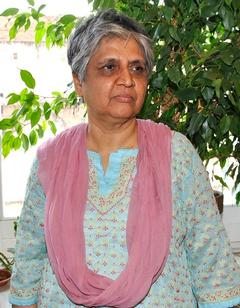Bio of Nalini ThakurProfessor Nalini M Thakur, Professor of Architectural Conservation
School of Planning and Architecture. Professor Thakur is one of India’s foremost experts in the filde of heritage conservation. Her’s experience over three decades in the field of architecture and conservation ranges from activist, professional, teacher, mentor and academician. She began her conservation training as a Fellow at ICCROM (UNESCO’s International Centre for the Study of the Preservation and Restoration of Cultural Heritage) in 1982 after completing undergraduate study at the School of Planning and Architecture, Delhi (SPA). She became a full time Architectural faculty member School of Planning and Architecture, Delhi (SPA) there, and later pursued graduate studies at the University of York as their first Charles Wallace scholar. The 1980’s was a period that witnessed the emergence of heritage conservation and its development worldwide as we know it today. Thakur was at the forefront of the movement in India. After Following her ICCROM training, Thakur became utilized her professional expertise for the benefit of the community through the activities of the local architectural heritage group, the Conservation Society Delhi (CSD). She was an active founding member of the Conservation Society Delhi (CSD) CSD and brought Delhi’s heritage to her citizens by, among other activities, holding heritage walks on Sundays. Later, as President of CSD, Thakur organized a year long campaign called, “Historic Delhi World Heritage City”. She also developed new approaches to architectural conservation at the SPA through innovative methods and frameworks for learning and teaching. Most significantly, she developed a holistic model that proposed an integrated way of development of “living” architectural heritage management from first principles. This framework approaches the challenge from a position of no authority by focusing on the knowledge potential of heritage and its relevance to long term benefits to create a society that is responsible to its resources. Although her initial teaching at SPA focused on teaching architectural history and guiding “designing in context” studios, her work in conservation led her to be named as founding Professor in the newly inaugurated Department of Architectural Conservation at SPA, a post she still holds today. During her tenure she headed the program for ten years, and developed and ran the Masters Programme in Architectural Conservation. Other high points in her long career, include:
Additional Help and InformationAre you in need of assistance? Please email info@berkeleyprize.org. |
|

